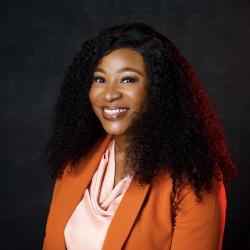Introdução
Data science is a powerful tool. Yeshimabeit Milner is building a movement of data scientists and community changemakers to transform the role that data typically plays in our lives from a tool of control to a powerful force for social change.
A nova ideia
With Data 4 Black Lives, Yeshimabeit Milner is building a movement of scientists, technologists, activists, and organizers to transform the role that data plays in our lives; whereas data is more likely to be used today by established powers - be they governments or companies - as a tool of control, Yeshimabeit is unleashing the power of data as a catalyst for social change. Currently, big data and algorithms are predominantly in the hands of the powerful. The field is little understood among non-experts, and experts too often do not understand how the data sets that support their tools are shaped by bias. Activists and organizers fight against data’s usage in racist policies, like predictive policing and the school-to-prison pipeline, but they are not using data in their own organizing, and because of that often fall short. As Yeshimabeit points out, data itself is a tool. It doesn’t have to be used to perpetuate injustice against people of color. It could just as effectively be used to support social justice movements, but the same activists and organizers fighting against data malpractice do not have the capacity to use data for good because they historically have not had experts on their side. Yeshimabeit is bringing experts and organizers together, to empower social justice movements to use data to create social change.
Data 4 Black Lives today is a national network of more than four thousand community changemakers and data scientists. Through annual convenings and ongoing engagements in-person and online, Yeshimabeit is building architecture to connect these community members to one another. They are marshaling this community to change national and local public policy, educate people about how algorithms impact their lives, and promote the accessibility of data. The goal is to shift the power of data science from being concentrated in the hands of the few and bring it to the marginalized and the people advocating for them. This work builds the infrastructure for a new model of data-driven advocacy.
Ultimately, Yeshimabeit is working to shepherd a cultural change in the world of data, away from exploitation and towards a new model where everyone working to benefit the community has access to data tools, rather than concentrating them in the hands of people who already have money, power, and influence. At present, it’s against the culture for big companies to consider the impact new data-driven technologies will have on the lives of the people most impacted by them, against the culture for data-driven research institutions to invest research dollars into initiatives that promote social justice, and against the culture for schools to teach data scientists and software engineers about the history of technologically-driven inequality. Yeshimabeit is creating new roles for these data scientists and software engineers, and in so doing giving activists new tools for pursuing social change.
O problema
Since the advent of computing, big data and algorithms have penetrated virtually every aspect of our social and economic lives. These new data systems have tremendous potential to empower communities of color. Tools like statistical modeling, data visualization, and crowdsourcing, in the right hands, are powerful instruments for fighting bias, mobilizing people, and promoting civic engagement.
But history tells a different story, one in which data is too often wielded as an instrument of oppression, reinforcing inequality and perpetuating injustice. Redlining was a data-driven enterprise that resulted in the systematic exclusion of Black communities from key financial services. More recent trends like predictive policing, risk-based sentencing, and predatory lending are troubling variations on the same theme.
Today, discrimination is a high-tech enterprise. As credit scores are used to deny hardworking families housing and employment and as facial recognition software is being used to surveil schoolyards and borders alike, the racist policies of the past have been compounded by the technological advances of the present. The problem is several layers deep:
1. Data is powerful and it is being concentrated into the hands of only a few people and institutions. The introduction of new technology is exposing but also exacerbating injustice especially in the use of big data and algorithmic decision making. Most of these algorithms are “black boxes” -- their inner workings are hidden from the public. When they are not, they are usually shrouded in complexity. Their biases and defects are buried in the pages of source code and mathematical formulas that produce the appearance of fairness and objectivity.
2. The data scientists, software engineers and mathematicians who build these algorithms often do not reflect the communities most impacted by these technologies nor do they understand how the algorithms they create reinforce historic patterns of racism and inequality. Those who do understand and are compelled to act do not know how.
3. Activists, organizers, elected officials and educators know the power of data and have the ability to use it to shift policies and win change locally, but do not have the data capacity and expertise to do so. They know that data is a powerful tool, as they are often mobilizing to combat systems that use it, but without the ability to use it themselves, they are fighting on an uneven playing field.
There are a number of initiatives focused on diversifying the pipeline of people with jobs and skills in technology and data science. These initiatives work to encourage more women and people of color to develop these skills in the hopes that the future demographics of these fields will look much different than today’s. This approach complements Yeshimabeit’s, and Yeshimabeit does work to educate and inspire marginalized people to build capacity in data science, but rather than working to place new people in existing systems, she is building a new system for the most marginalized.
A estratégia
Fresh out of college and twenty two years old, Yeshimabeit returned to her home city of Miami to lead a campaign centered around black infant mortality rates, which have remained constant over the past fifty years as overall infant mortality rates have steadily declined. Mothers in the community knew that this tragedy was connected to hospital policies such as the aggressive marketing of infant formula and unnecessary cesarean sections. But without data, community outcry was ignored. Yeshimabeit realized the urgency of this issue and went to work. With a small team of moms, she surveyed 300 mothers on their experiences at Jackson Hospital, the largest public hospital in the country. She published a report with their findings as well as a set of policy demands. They made do with very little resources and no support from other women’s health organizations (not even the local breastfeeding coalition). But with a lot of vision and Yeshimabeit’s commitment to letting directly impacted families speak for themselves through data, the impossible was accomplished: a campaign that would have typically taken years to win was won within months. They couldn’t bring 300 mothers into the boardroom, but the hospital CEO couldn’t deny the data they collected. They published a report calling for the hospital to provide more breastfeeding support and education to new mothers, and to stop aggressively marketing infant formula. The Miami Herald picked up the story and, within days, the hospital had publicly announced a set of permanent changes. Today, the lives of tens of thousands of mothers and babies have been impacted by the changes in hospital practices they fought for.
Yeshimabeit achieved these outcomes by leveraging insights from her background in research and her collaboration with other researchers. Knowing that these are luxuries many organizers don’t have, she founded Data for Black Lives in 2016 to equip more local changemakers across the country with the data tools and expertise needed to protect their communities. What started as an annual in-person convening has grown into a network of more than 4,000 data scientists and community changemakers strategically connecting to not only change local systems, but transform the landscape of data science for social change. Yeshimabeit is not just raising awareness of how the playing field can be leveled when community groups are powered by data. She is creating a movement that shapes policy, educates the public, and calls for a reimagining of who has access to data science.
There are three mutually-reinforcing bands of work: First, Yeshimabeit is not only helping raise awareness of the full landscape of challenges associated with big data and algorithms amongst community changemakers, but she and Data 4 Black Lives work to channel that understanding not just into what issues are taken on, but how grassroots groups are tackling them. Data 4 Black Lives works to educate its community about the mechanics behind things like FICO scores and other common algorithms that impact everyday life. By educating community members about data, how it’s currently used, and how it can be used more effectively by community groups like themselves Yeshimabeit is helping build a movement that calls for democratizing data (like granting easier public access to publicly-funded datasets) that’s more impactful because it makes use of these effective tools itself. It is in this way that Data 4 Black Lives is helping develop - among existing changemaking groups - a new generation of leaders who already have community roots, vision, and empathy but are now equipped with new tools and technological know-how. These changemakers approach problems differently, come to new solutions, and make more impactful change.
Using data science is a winning proposition, but data science requires building data sets or gaining access to existing ones and cultivating awareness and training grassroots organizers in a very technical and rapidly changing field like data science is not an easy undertaking. So, for this reason the Data 4 Black Lives network is focused on connecting people working to make change in their communities with people well-versed in these amplifying tools. The second thrust of Data 4 Black Lives’ strategy, then, is to engage data scientists themselves. Six hundred people attended the second annual Data 4 Black Lives convening in January of this year, including numerous technologists, data scientists, and other experts in mathematics and engineering. There, they mingled, educated, and learned from another type of expert: community changemakers who are intimately familiar with organizing work and the on-the-ground needs of their communities. Bringing these two groups together creates new opportunities for change and the event is less of a conference and more of a chance for the network to innovative, grow, and do R&D for the field. Last year, for example, they piloted an “opportunity fair” which brought together the nation’s top tech firms and graduate programs under a commitment to hire and/or train underrepresented groups.
Today the thousands of data scientists and community changemakers as part of the Data 4 Black Lives community are effectively disrupting the school-to-prison pipeline in places like St. Paul, Minnesota where they are challenging and overturning plans to give schools access to sensitive child welfare and juvenile justice data. Yeshimabeit is building the architecture to connect them beyond the conference, a digital switchboard that connects advocates who need data science with data scientists who want to work for social change.
Thirdly, Data 4 Black Lives’ works across the board to make existing data more accessible to community-level changemakers. This is done in part by data scientists in the Data 4 Black Lives community who can help make cumbersome public datasets more accessible and actionable for community groups. But Yeshimabeit’s vision is bigger, still. Large groups like Facebook have access to mountains of data. Yeshimabeit has called on Facebook to share a public trust of anonymized data with researchers and advocates, believing that this tremendous volume of important information has the potential to be used not as a tool for for-profit advertising and clandestine political activity as in the Cambridge Analytica scandal, but for open and positive social change. This data could be used to fill gaps in research funding for gun violence, maternal and infant health, and many other crucial yet underfunded issues. In particular, Facebook has volumes of data on mental health and natural disasters, which in the right hands could be used to boost understanding of and solutions for these issues. Right now, their data is only accessible to for-profits doing advertising work, but Yeshimabeit believes that that could change with sustained public pressure.
Through these bands of work, Data 4 Black Lives is creating a new category of data-savvy community changemaker powered and supported by a big and growing national network of community-engaged data scientists. This alone is game-changing. Datasets replicate the biases of the people who put them together while appearing “objective,” and people of color are vastly underrepresented in the industries and roles where data science decisions are made. Many organizations across the U.S. train young people of all backgrounds in STEM skills that can help them land tech jobs, but Yeshimabeit’s work and countless individual examples from across the D4BL community show that forging partnerships and providing hands-on experience sparks people who pursue data science vocations. Furthermore, by democratizing data these roles and opportunities are increasingly not just at “Big Tech,” but in organizations of all kinds that are adopting this powerful set of tools and strategies.
In addition to this on-the-ground impact, they’ve set - and surpassed - organizational goals of impacting one national and three local public policies each year. Nationally, they’re fighting biased algorithms with the Algorithmic Accountability Act, which would allow the FTC to impose anti-bias regulations on algorithmic decision-making. Locally, the wins in St. Paul and elsewhere are changing lives on the ground as well as the way local organizers approach a powerful tool: data science. Yeshimabeit will achieve these goals through a combination of direct and catalytic impact. D4BL has a fulltime policy director who, along with many across the network, stays abreast on local, state, and national polices and directly offers workshops and trainings to everyone from community organizers to Senators and staff on Capitol Hill. The catalytic impact comes through the growing network of formal chapters; they already have D4BL chapters and hubs in Seattle, DC, NY, Chicago and the Twin Cities with a dozen more in the works (and outside of the US, too, from Chiapas to Accra, and Colombia to the Netherlands). Chapters share needs and offers with the global network while organizing locally. Yeshimabeit has already designed a $10M fund to support distributed R&D and strategic programming across the network and is beginning to raise its capital from philanthropic funders as well as member contributions. In these ways, she’s building a structured and sustained architecture for the movement.
A pessoa
Yeshimabeit grew up in predominantly black neighborhoods of Miami and was raised by an immigrant single mother. School was a safe haven for her. She committed herself to organizing after some friends of hers, attending a neighboring school, organized a nonviolent protest in response to the vice principal putting a 14-year-old student in a chokehold. Instead of being recognized for their initiative and leadership, their protest was met with violence. SWAT team units swept the school, barging into the cafeteria where they congregated. Over 30 students were injured from being beaten with police batons, or from their small frames being slammed against police cars by grown officers. On CNN, the headline read: Riot at Miami Edison High School. Yeshimabeit joined Power U Center for Social Change and immersed herself in organizing because she knew that her life and the futures of countless other young people depended on it.
Yeshimabeit and her fellow students went to school board meetings to testify about their school experiences but were thrown out by their superintendent. Tired of this treatment, they decided to take matters into their own hands and surveyed 600 students from all over Miami about their experiences with suspensions and arrests in schools. They turned that data into a comic book, Telling It Like It Is: Miami Youth Speak Out on the School to Prison Pipeline. They knew that they could be ignored as individuals, but no one could deny the data that they collected. To this day Yeshimabeit still meets people who remember – or even still use – the Telling it Like It Is comic book. Yeshimabeit went on to college at Brown University with a clear motivation: to gain new skills in data science and research methods to amplify the voices of people who had long been silenced.

 Tile image
Tile image Tile image
Tile image Tile image
Tile image


